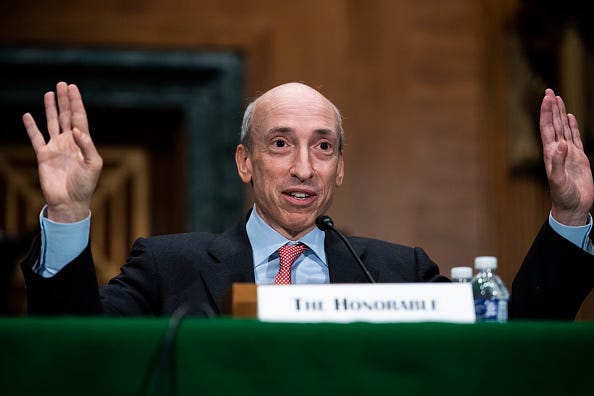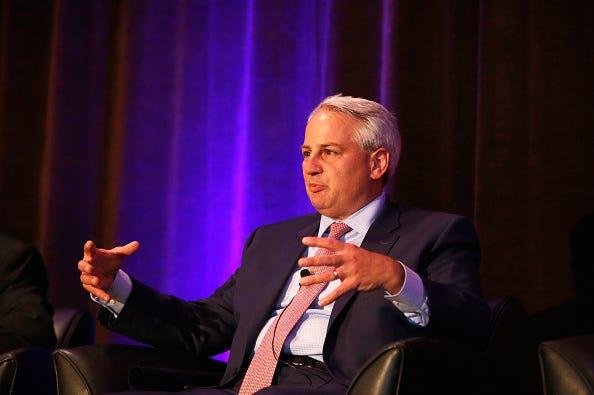Talking Banking Turmoil; SEC Workers Surprisingly Content; Dueling Views on Stock Market Reform
Capitol Account: Free Weekly Version
This week we delved into one of the more complicated financial regulation battles taking place in Washington — the SEC’s overhaul of stock trading rules. The Gary Gensler-championed plan is getting a lot of resistance from all corners of the markets. But parts of it have won support from some money managers, exchanges and groups that represent small investors. We broke down some of the opposing views. Also at the SEC, we took note of a new survey that shows workers at the agency may be happier under Gensler than many (including a lot of politicians) have surmised. And not forgetting the recent banking crisis, we spoke to a top trade association leader about the fallout from the Silicon Valley Bank collapse.
Thanks for reading our Saturday free edition, with a selection of abbreviated stories that we wrote over the course of the week. Capitol Account is published daily and has a lot more coverage of the agencies, lawmakers and lobbyists driving financial policy. If you like what you see, we’d love to have you subscribe to our full newsletter.
Q and A: As president of the American Bankers Association, Rob Nichols has understandably been on overdrive since last month’s failures of Silicon Valley and Signature banks. Though the industry seems to have more Washington trade groups than one can even remember, Nichols’ organization represents the entire spectrum of lenders – from the smallest to the largest. That’s put ABA at the center of the action as lawmakers and regulators look to enact tougher regulations and new laws in response to the crisis.
An assistant secretary for public affairs at the Treasury Department during the George W. Bush administration, Nichols has been at the helm of ABA for more than seven years. He previously spent a decade running the Financial Services Forum, an association for the CEOs of the biggest U.S. banks. Read on to hear Nichols’ thoughts about the recent turmoil, the CFPB’s attack on bank fees and why he loves Sharpies. What follows is our (lightly edited and condensed) conversation.
Capitol Account: It’s been a few weeks since the failures. Are we out of the woods?
Nichols: We've seen a considerable amount of stabilization in the banking sector over the last few weeks, for sure. There's a lot of work ahead – in terms of thinking about the root causes of the crisis and what, if any, public policy steps should be taken. But we've been doing a lot of pulse checks with our members all across the country, almost on a daily basis since early March, to ask about the conditions at their bank, the health of the bank. We're hearing very, very positive reports. I'm encouraged by that certainly, and I'm keeping my fingers crossed.
CA: It seems like both politicians and regulators are already advocating for big policy changes in all sorts of areas – from capital to supervision to deposit insurance. Broadly, what is your message to them?
RN: We've seen a lot of people with prescriptions that are being delivered – rather early in our opinion – with regard to what actually happened. That's why we think [policy makers] need to take time to be thoughtful, to be deliberate. And to see these investigations and these inquiries and these studies take place first, before people of any political stripe try to put forward legislation. We think that's the right move. We think that's very important. We've seen people, again of all political ideologies, decide what went wrong and [say]: `Here's the solution.’ Some of that's been a little premature.
CA: Much of this work will likely be done by regulators. Can they fend off the political pressure?
RN: Everyone knows that there's some political influence on regulators. That said, it's our hope that the regulators really are reflective, deliberate, thoughtful — to get to the root causes before making any judgments that additional rule changes are needed or not…Was this just a series of bank failures and potentially supervisory failures, exacerbated by social media? Or was it a true failure of all the rules that exist?...I would say the former versus the latter.
CA: Fed Chairman Jerome Powell has already called for strengthening both supervision and regulation. Is that a sign new rules are inevitable?
RN: Perhaps. That's why I think these important investigations that are underway by the Fed, by the GAO and so many others need to take place. The hearings as well. We've seen one round of hearings, just the hearings with the regulatory leadership. We haven't yet seen the hearings with the SVB executive team. Those are coming next, and soon.
CA: Democrats have pinned a lot of blame on the bill, known as S.2155, that rolled back some of the Dodd-Frank rules. Do you think that is misguided?
RN: There are a lot of people who are pointing fingers to potential accelerants and causes here. And some of those causes, accelerants and fingers are pointed appropriately, and others are a little misdirected.
CA: Overall, the industry strongly supported that 2018 legislation.
RN: Yes. It did a lot for community banks, mid-size banks as well. A lot of common sense public policy improvements were achieved there. It had significant bipartisan support, and it's really hard to get bipartisan support.
CA: There was a lot of talk at ABA’s recent Washington conference about the SAFE Banking Act, which would allow lenders to do business with legal pot companies. Why is the bill a priority for the industry?
RN: Banks are caught in this uncomfortable inconsistency between state and federal law…It seems every year another state or two legalizes. We're at 80 percent of the United States now, and banks are unable to do business – not only with that industry but with the ancillary industries, the mall owner, the accountant, the person providing plumbing services for these entities.
CA: It seems that legislation gets caught up in the broader debate about whether marijuana is a dangerous drug.
RN: We're not pushing for delisting cannabis from the Controlled Substances Act. We're just pushing for a safe harbor.
CA: Let’s talk about the CFPB and Director Rohit Chopra. He seems to be the regulator that the banking industry dislikes the most.
RN: Director Chopra certainly has been quite busy for the last several months. As you're aware, we've engaged in litigation against the CFPB.
CA: This is a case about the bureau revising its supervision manual to include “discriminatory conduct.” You argue this was done without proper notice and violates the law governing federal rulemaking. But progressives have blasted the industry for bringing the case, saying it is essentially defending the right to discriminate.
RN: To be clear and emphatic, there's no room for discrimination in banking…We viewed the bureau as taking a step that was illegal. We felt, as a last resort, we had to raise our hands…Regulators shouldn't be able to do illegal things outside of the bounds of Congress. That's what this litigation is about. It's not about discrimination. It's about checking a regulator.
CA: Chopra has also enraged a lot of executives we talk to with his talk about “junk” bank fees.
RN: The comments that we've heard from the White House and the consumer bureau around the bank fees…have been incredibly misleading, inaccurate and off-base…Every other industrial sector is able to charge fees for services. The federal government charges fees for services….To suggest our sector shouldn't be able to charge fees is awfully misguided. The fraud protections, the cyber protections, the ecosystem around banking to keep your money safe and secure – all these things come in part from these fees… (Thursday)
Follow us on Twitter @CapitolAccount and on LinkedIn by clicking here. We’re always looking for stories, so if you have any suggestions on what we should cover (or comments about Capitol Account), shoot us a note. Jesse can be reached at: jwestbrook@capitolaccountdc.com and Rob at: rschmidt@capitolaccountdc.com. If somebody forwarded this to you and you’d like to subscribe, hit the button below. Please email for our special rates for government employees and academics, and group discounts for businesses: subscriptions@capitolaccountdc.com.
Morale Up: The SEC chief has come under a lot of fire – from lawmakers and the agency’s own inspector general – for relentlessly driving the staff to write dozens of new regulations. But despite reports of increased attrition and exhausted managers, it turns out that the workforce is actually pretty content.
That’s according to the closely followed “Best Places to Work in the Federal Government” survey conducted by the Partnership for Public Service and Boston Consulting Group. A preview of their 2022 report released last week ranks the SEC third among mid-sized agencies – two slots higher than the previous year. Call it a win for Gensler.
The findings surprised us a bit, and they will definitely shock a number of Republicans who’ve seized on the issue of worker unrest to bash the SEC chief. At a recent appropriations hearing, for instance, Rep. John Moolenaar told Gensler that last fall’s IG report raised questions about his ability to lead the agency. For his part, Gensler has downplayed the internal watchdog’s findings, saying that the SEC’s attrition rate is similar to other government agencies and pointing out that people often leave the commission for much higher paying jobs.
Gensler, who is about to hit his second anniversary at the SEC, recently put some of his other troubles with employees behind him by finalizing a collective bargaining agreement with the union. (Though a provision in the deal that requires in-person work only two days per two-week pay period has also set off some politicians.)…(Wednesday)
Opposing Views: The SEC’s plan for setting up auctions to handle retail orders is by far the most controversial aspect of its stock trading overhaul. Gensler emphasizes that it will result in better prices and long-term cost savings for small investors. But large swaths of the financial industry (including brokers, asset managers and market making firms) see the idea as a dangerous experiment that could be disastrous for the U.S.’s best-in-class equity markets.
Here’s a look at the auctions though dueling comment letters filed at the SEC last week. On the pro-side is We the Investors, a group led by Dave Lauer, that has long railed against the current system where many brokerage firms sell their customer orders to wholesalers (also known as market makers) for execution. It wants to eliminate that practice, known as payment for order flow, and sees auctions as a good way to accomplish that goal.
On the other side is Virtu Financial, a leading wholesaler. Its CEO Doug Cifu, has been an early and persistent critic of the SEC plan, especially its analysis of the costs and benefits. (He’s also warned that the agency will be sued if it goes ahead with the massive overhaul.) As Cifu writes in his 53-page critique, the rule’s “promises are, at best, entirely theoretical and speculative.” Auctions, he adds, are likely to “diminish the substantial benefits that retail investors currently experience.”
For his part, Lauer dismissed those types of comments as scare tactics from firms that benefit from the status quo. “I find it pretty hypocritical when they claim they are looking out for markets and investors when they are really just looking out for their bottom lines,” he tells Capitol Account. That’s a view Lauer has also been able to share with Gensler — because the SEC chief has appeared at two Twitter events that We the Investors hosted for retail traders. One more thing to note about Lauer is that he’s sought to leverage his legions of social media followers to counter the industry’s lobbying efforts. The comment letters his group wrote have been copied and submitted to the SEC thousands of times.
What follows are some highlights of the arguments made by Virtu and We the Investors. First is Virtu:
Depends what you mean by competition: It’s no accident that the SEC calls its auction plan the “order competition rule.” Gensler has long lamented that most retail stock transactions are handled by market makers who operate in “dark” markets. Allowing rivals to bid in on an exchange where prices are displayed, the SEC chief argues, will result in better prices – and save investors money. Virtu agrees that competition is paramount, but stresses that it already exists in the current system. Wholesalers, the company says, are routinely battling to win business from brokers. The upshot of this “intense competition” is that investors win, the firm says.
Savings: There’s been a lot of debate about how much money the auction rule would save for small traders. The SEC’s estimate pegs it between $1.12 billion and $2.35 billion annually. Virtu disputes those figures but it also offers its own analysis of the current system – which, it notes, the SEC doesn’t do. And the firm found that investors are already getting more than $20 billion in yearly savings.
The number includes $3.6 billion for improved prices and $7.2 billion for what Virtu calls “size improvement.” That occurs when, say, an investor wants to sell 5,000 shares of a stock but the current national best bid to buy is for 1,000. Instead of simply executing against the 1,000 shares on the bid (and then filling the remaining 4,000 at a worse price), Virtu and other wholesalers will use their own capital to fill the entire order at a price that is usually better. The retail crowd also saves an estimated $8 billion by not paying commissions, and another $2.9 billion by getting an almost immediate execution, Virtu says.
Can the exchanges handle this? While the SEC plan doesn’t flesh out how the auctions would be conducted, most agree that they would be run by the major stock exchanges. It’s an open question, Virtu says, whether the trading platforms would be able to handle the massive surge in traffic. In its letter, the firm estimates that exchanges would likely have to handle between 7 million to 22 million auctions a day. But the proposal, Virtu points out, doesn’t discuss “whether the exchanges are in a position to undertake this role from a technological perspective.” Case in point, the firm says, is the recent NYSE snafu that caused major chaos in the markets.
We the Investors:
Auctions are ok, but ban PFOF: Lauer is quick to point out that a market structure with auctions is preferable to what exists today. But in his ideal world, payment for order flow would no longer exist. That’s because he believes the current system prompts brokers to make self-interested decisions when they route orders, rather than sending them where customers will get the best deal. Lauer wants the same prohibition to apply to exchanges, calling for a ban on the access fees and rebates they offer to attract trading. We the Investors’ letter highlights what it sees as the problems with the payments:
“It’s time to turn the page. The inducements and incentives underlying PFOF distort order routing and violate the principles and duty of best execution. In doing so, PFOF undermines the fairness, simplicity and transparency of the markets, creating a warped system in which investors are unable to find each other or interact directly, and in which their orders are productized for the benefit of high-speed speculators and rent-seekers.”
Cost savings: We the Investors strongly agrees with the SEC that auctions will reduce retail investors’ costs. But it thinks the agency is dramatically understating the savings. The group says that the SEC’s analysis fails to account for how much the spread between the best bid and best offer would tighten. The letter points to a study from last June that looked at a subset of stocks and found the reduction may lower costs by about $7 billion. All told, We the Investors argues that actual benefit might exceed $10 billion a year. “This lays waste to the wholesalers’ argument that they are providing more price improvement and more competitive trading prices relative to the on-exchange experience,” the group writes. “Wholesalers are only able to provide price improvement because they have ‘first dibs’ on any order they receive.”
Things aren’t that great: Opponents frequently argue that U.S. markets are the envy of the world – and the SEC’s changes will threaten that status. We the Investors calls this a false narrative. The truth, it says, is that U.S. markets are the world’s biggest, but are far from the best. And it contends that unless the SEC issues bold policies to instill greater competition, things will only get worse:
“[M]arkets are becoming increasingly fragile. And as more trading volume is siphoned out of the lit system, and into the uncompetitive off-exchange realm, market efficiency is suffering, liquidity is dropping and transaction costs are increasing…[A]s bid-ask spreads widen in response to internalization, aggressive broker-dealers will be able to internalize an ever increasing portion of their order flow, sending only the most challenging of orders into the marketplace for execution – and only further worsening the situation corroding the value of the market. We wholeheartedly agree that these practices have corroded the value of public markets, and that the investing public is paying the price.”
…(Tuesday)
Like reading about market structure? We know a publication for you…




